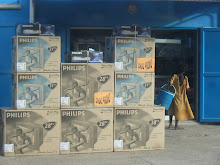In all of my blogs I have pointed out the quirks about Dakar. I have talked about the poverty, the transportation woes, the horrible men, etc but I never talk about how living in Dakar is just like living in any other city. For a “toubab” it is a comfortable life. I have everything I need and pretty nice amenities. I don’t have a washing machine, hot water, or dishwasher in my house but they do exist in Dakar. I do have my own room with my own blue bathroom with a toilet that flushes, most of the time, and running water. I eat three enormous meals a day and most of the time I feel like I am getting nutrients. There are very wealthy people in Dakar who drive around in big SUVs, spend time at the Almadies section of Dakar (home to Club Med), go to the Hotel Meridien’s over-priced nightclub (Serna Williams’ hangout spot), and have very privileged lives. I have had a middle of the road experience. I will never live like a poor Dakaroise without electricity, running water, or three meals a day but I don’t like going to the wealthy milieus either.
In any case, if you go to downtown Dakar there is a huge market, Marche Sandaga, that has everything you can imagine from cotton swabs to televisions to clothing. From there the main drag Pompidou/ Ponty has modern shops like a faux IKEA called IDEA, a sports shop, Moroccan variety stores, luggage shops, restaurants, bars, and boutiques. If you go to that road at night when most of the vendors are gone and the homeless people are covered up by blankets under glaring neon lights, it is easy to imagine being somewhere in the US. Dakar is very different than the rest of Senegal. In truth I cannot fairly say that I stayed in Senegal but rather that I spent 9 months in Dakar.
I think when it comes to Africa we tend to “other” it too much. It becomes “the place over there with all the destruction, disease, and famine.’ Nobody wants to say that there are cities that are developing or that one could live comfortably and modernly in such a city. Instead, Africa becomes a scary, unknown land full of safaris, huts, and tribal people. That is NOT the Africa I am living in and that is not the idea I want people to take away from my experience. There were certainly different things I had to get used to like horse and buggies sharing the highway with cars, the omnipresent physically disabled people, the large pockets of poverty, squishing onto a bus with 25 people over the capacity, waiting and then waiting some more, and of course sand, sand, and more sand. Yet my experience was formative. I learned an incredible amount about the “developing’ world, Islam, and myself. While this time in Dakar was occasionally difficult, trying, and unbelievably frustrating; on the other hand, it was completely worthwhile, interesting, and rich in many so many things that I never would have learned or seen if I had studied abroad elsewhere.
____________________________________________________________________
Now that I am home I think I am able to see Dakar in a different, perhaps clearer light. I think the distance has given me perspective on how much I had gotten used to and how much things like the poverty still bother me. All in all I am thankful for my experience and proud that I did it.
Tuesday, June 05, 2007
Subscribe to:
Posts (Atom)
